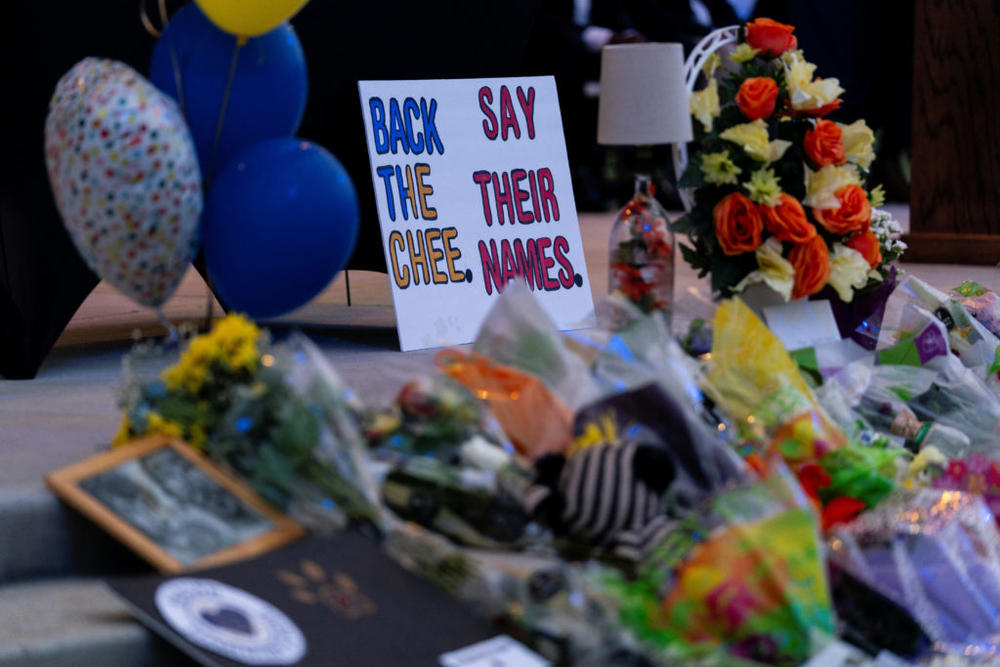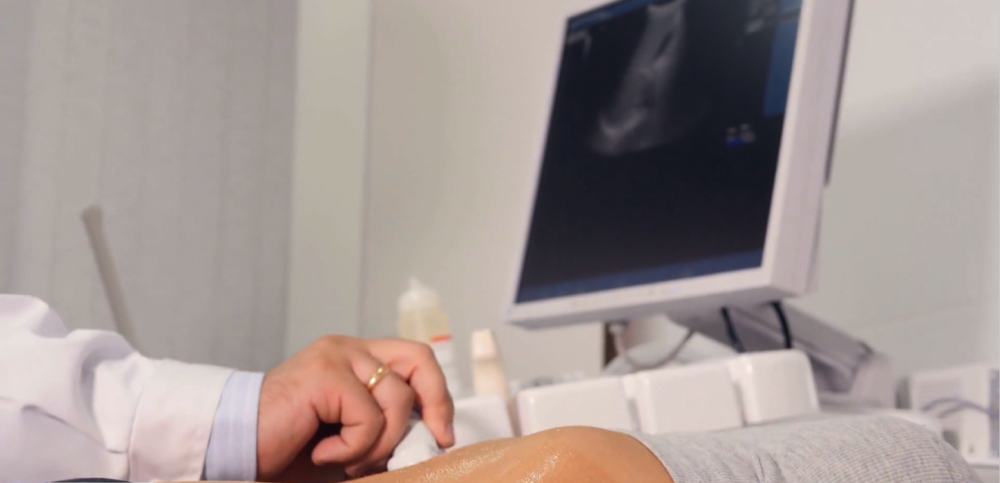
Section Branding
Header Content
Georgia Today: Apalachee students to return to class; Crisis alert badges; Abortion ban subcommittee
Primary Content
LISTEN: On the Monday, Sept. 16 edition of Georgia Today: Georgia schools use a new technology to enable a swift response in active shooter situations; a subcommittee by Sen. Jon Ossoff looks into Georgia's abortion ban; and a new study explores what is driving up the rate of childhood obesity in the state.

Orlando Montoya: Hello and welcome to the Georgia Today podcast from GPB News. Today is Monday, Sept. 16. I'm Orlando Montoya. On today's episode, Georgia schools use a new technology to enable a swift response in active shooter situations. A subcommittee by Sen. Jon Ossoff looks into Georgia's abortion ban, and a new report explores what's driving up the rate of childhood obesity in the state. Those stories and more are coming up on this edition of Georgia Today.

Story 1:
Orlando Montoya: Apalachee High School now has a return to class plan following the shooting that killed two students and two teachers there on Sept. 4. The school's principal says the return will be phased in starting Sept. 23. Other schools in the district went back to class on September 10th. Winder resident Sonya Turner has two daughters at Apalachee High School.
Sonya Turner: And there's a lot of those students in that high school that want to go back. They want to overcome this and go back and be strong. But then on the flip side, you have students who can't even eat. So there's not a one size fits all.
Orlando Montoya: She says she expects the return to be more about healing than instruction.
Story 2:
Orlando Montoya: A teacher who survived the shooting is thanking first responders, family members and others for their support in his recovery. David Phoenix was shot twice on Sept. 4 and said in a statement posted on Facebook yesterday that that day will be, quote, "forever etched in his memory." He was released from the hospital on Friday.
Story 3:
Orlando Montoya: Law enforcement officials are praising new technology used by Barrow County schools for enabling a swift response to the shooting. That crisis alert system includes a wearable badge with a button that, when pressed, will summon security. And other schools in Georgia are using this technology as well. Gwinnett County Schools chief of police Tony Lockard spoke with GPB's Peter Biello about the technology.
Peter Biello: So schools in Gwinnett County use these badges, which are made by a company called Centegix. Can you tell me a little bit about what stood out to you about this company's system when you selected it?
Tony Lockard: What we were looking at was the timeliness of the responses; that it actually populates to the administration or district-level individuals or our officers receiving the alerts. Also, the functionality, how user friendly is it, and so forth. And also given feedback again from our faculty and staff.
Peter Biello: Tell us more about how it works. It's a wearable badge for teachers and staff, not for students. What happens when they press the button or how does the button work?
Tony Lockard: So the way the technology works is it's a badge. If you think of something the size of a credit card and it can be on a lanyard around your neck, in a little sleeve. I'll use this example. You could have a teacher that goes to use the restroom and walks into a public restroom at the school and finds a student lying on the ground, possibly experiencing a seizure or something like that. They can push the button on the badge three times and we say it's a three-button push, which is indicative of "I need help." One, two, three: I need help. And then what will happen: inside the school, it'll send an alert. That — that three-button push will hit one of the beacons that's very close proximity, like in the bathroom. It'll hit the beacon. It'll send a signal to individuals designated inside each school. This is commonly administrators and school nurse and also the school resource officers. They'll get an alert.
Peter Biello: Not only does it send an alert, but it actually sends location information. So you have instant information about what's happening and where in the school that is happening?
Tony Lockard: That is correct, Peter. It's actually, it'll — it'll send a, like a map overlay of the school letting us know where that where that sensor is, is, is hitting. And then if the administrator is not at their desktop, if they're out walking around in the school, it will also send them an alert to their phone. So then they also — they have multiple ways of receiving that alert.
Peter Biello: And can you tell us a little bit about how the Centegix system would enable teachers and staff to call for a lockdown?
Tony Lockard: It is — it's basically a force multiplier, and I'll use that same scenario. A teacher, a staff member walking into the parking lot and they possibly see some suspicious activity. It could be that they see an individual taking a gun out of a car. They do an eight-button push. It'll automatically put the school into a hard lockdown. And inside, what will happen, the beacons, they will turn red. They'll start like a, almost like a, like a police light, like a red light circling — a strobe. And then also what we've integrated is with our PA system. So it'll make an announcement. We don't want a teacher, if they see something suspicious, that they have to "Well, let me get my cellphone and call 911. Or do I call the front office? Do I call the principal?" It's additional eyes and ears in all of our schools that help keep our schools safe.
Peter Biello: Well, Gwinnett County Schools chief of police, Tony Lockard, thank you so much for speaking with me. Really do appreciate it.
Tony Lockard: Thank you so much, Peter.
Story 4:
Orlando Montoya: Republican vice presidential candidate J.D. Vance and his Democratic opponent are both campaigning in Georgia today. Vance is expected to rally conservative evangelicals at the Georgia Faith and Freedom Coalition's annual dinner tonight in metro Atlanta's Cobb County. And Democrat Tim Walz is expected to arrive in Macon tonight and give remarks there tomorrow morning before traveling to Atlanta later in the day.

Story 5:
Orlando Montoya: Georgia's abortion ban came under fire at a U.S. Senate hearing today. Georgia Sen. Jon Ossoff led a subcommittee looking into the ban. MacKenzie Kulik testified about her pregnancy. She said it was non-viable because of a genetic condition and didn't meet the ban's requirements for an exception.
MacKenzie Kulik: If I had not been able to travel out of state, I would have been forced to carry a non-viable pregnancy until the baby died in utero, or I would have developed an infection that threatened my health enough to qualify for an intervention, or I would have had to deliver a baby only to watch her suffer.
Orlando Montoya: She received an abortion in North Carolina. Ossoff scheduled the hearing less than two months before an election in which abortion remains a key issue.
Story 6:
Orlando Montoya: A new report from Trust for America's Health shows barriers to nutritious food and physical activity are driving up rates of obesity in Georgia communities, especially among children. GPB's Ellen Eldridge has more on that story.
Ellen Eldridge: A decade ago, no state reported an obesity rate of more than 35%. But now the Centers for Disease Control and Prevention says there are 23, including Georgia. J. Nadine Gracia is president and CEO of TFAH. She says many people view obesity as an individual problem and not a public health problem.
J. Nadine Gracia: Many factors contribute to obesity, not only simply individual behavior, but assuring that really the types of structures and conditions exist in communities that make healthy eating and physical activity accessible and affordable to everyone.
Ellen Eldridge: Other challenges include access to health care, high rates of poverty and housing insecurity. For GPB News, I'm Ellen Eldridge.
Story 7:
Orlando Montoya: The family of Ahmaud Arbery is waiting for stalled court proceedings to resume in the case of a former Georgia prosecutor accused of interfering with the police investigation into his killing. A grand jury indicted former district Attorney Jackie Johnson on misconduct charges in September 2021. Now, three years later, the judge overseeing the case acknowledges that it's moving at a snail's pace. But senior Judge John Turner says delays have been unavoidable. One of Johnson's attorneys also is defending Atlanta rapper Young Thug, whose racketeering and gang conspiracy trial has dragged into 19 months. Johnson is accused of trying to protect Arbery's shooter and his father, who were later convicted of murder. Johnson has denied wrongdoing.
Story 8:
Orlando Montoya: State lawmakers will begin hearings this week looking into the role private water systems should play in meeting Georgia's demands for growth. The issue heated up in this year's General Assembly when lawmakers voted largely along party lines to allow private utilities to provide water where public systems couldn't get up and running quickly. The law was aimed at the massive Hyundai Electric vehicle manufacturing plant being built west of Savannah.
Story 9:
Orlando Montoya: Oglethorpe Power is asking for rezoning variance and other special use permits to build a $2 billion natural gas-fired electric plant in middle Georgia's Monroe County. The nonprofit utility announced its intentions to build the plant earlier this year. Last week, the county submitted plans to the State Department of Community Affairs detailing its water, wastewater and other development impacts.

Story 10:
Orlando Montoya: And notable figures in politics, film and music are set to take the stage tomorrow for a concert celebrating Jimmy Carter's centennial. The former president remains at home in Plains, where he's been under hospice care since February 2023. The concert will be recorded for broadcast on his 100th birthday, Oct. 1. Among the performers, Carlene Carter, daughter of June Carter Cash and stepdaughter of Johnny Cash, both country music legends, spoke to GPB last week.
Carlene Carter: If it lifts up one soul just a little more, we are doing our job as musicians, and he was doing his job as president by introducing music into the White House in a way it had not been before, which connected him to a whole generation of people that adore him. And I am in that generation.
Orlando Montoya: The concert will take place at Atlanta's historic Fox Theater, and its broadcast special will air on GPB-TV on Oct. 1.
Orlando Montoya: And that's it for today's edition of Georgia Today. If you'd like to learn more about these stories, including an extended conversation with Carlene Carter and Angelique Kidjo about their performance and Jimmy Carter's impact on music, go to GPB.org/news. You'll find all of our GPB reports there in one place. If you haven't yet hit subscribe on this podcast, do that now. It helps you to keep us current in your feed. And send us feedback. We'd love to know what you have to say about our podcast. Email us at GeorgiaToday@GPB.org. I'm Orlando Montoya. We will be back again with more Georgia Today tomorrow.
---
For more on these stories and more, go to GPB.org/news



